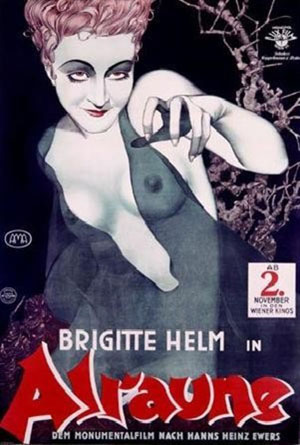We begin in New York, where Rituals in the Avant-Garde: Film Experiments in 1960s-70s Japan is on at Anthology Film Archives through Tuesday: “This series brings together a wide scope of artistic activity that emerged from the outer limits of film expression in the most politically fervent period of Japan’s recent history. The program navigates rarely screened works from the 1960s and early 1970s that span genres including documentary, dance film, animation, softcore pink, and queer cinema. What ties these seemingly disparate films together are their commitment to radical expression, which came to redefine what constituted avant-garde output.” Aaron Cutler recommends catching Noriaki Tsuchimoto’s documentary Minamata: The Victims and Their World (1971), screening tonight.
Also in the L: In Henrik Galeen’s Alraune (1928), screening tonight as part of the Anti-Valentine’s series at Spectacle, Michael Atkinson finds “the Nazi preoccupation with racial engineering and inheritance, but twisted into a father-daughter Frankenstein story whose monster is a selfish (read: self-determining) teenage tramp who escapes from her convent and just wants to have fun, even if that means driving her patriarch crazy with jealousy and lust.” That tramp is none other than Brigitte Helm, who’d play the role again two years later in Richard Oswald’s Alraune.
San Francisco. Sexual Politics: The Occasionally Autobiographical and Always Personal Films of Joe Swanberg opens tomorrow at the Roxie and runs through the weekend. Stephen Saito argues that “even those who have done a superficial reading of Swanberg’s work over the past eight years must admit there’s an unusually rich ethnography of the era of filmmaking he grew up in and eventually helped push further. An inadvertent chronicler of the technological shifts that made it possible for a kid from the Midwest to establish himself as an internationally renowned director without leaving home, Swanberg didn’t just embrace the advent of professional grade digital cameras as a means of conveying his personal stories, but actively recruited other moviemakers who did the same to star in his films, creating something of a documentary of his own life and the American new wave of the 2000s with the likes of the Duplass Brothers (Cyrus), Lynn Shelton (Your Sister’s Sister), Ry Russo Young (Nobody Walks), Andrew Bujalski (Funny Ha Ha), and Ti West (The Innkeepers), among others, all putting in appearances.” Saito and Swanberg discuss “his evolution as a director, his impact on other filmmakers and the start of a new chapter with his next film Drinking Buddies, an Anna Kendrick-Olivia Wilde comedy set to debut at SXSW in a couple weeks.” G. Allen Johnson talks with him as well for the Chronicle.
Nashville. “For years,” begins Jim Ridley in the Scene, “hardcore Nashville moviegoers have lamented the lack of a microcinema filling a missing niche in the city’s big-screen offerings: experimental film, avant-garde features and beyond-obscure repertory titles. Now comes word that James Cathcart, a Scene contributor and one of the city’s most dogged and devoted cinephiles, will be curating a monthly film series at Third Man Records co-sponsored by The Belcourt.” The series opens tonight with Dustin Guy Defa’s Bad Fever (2012), recently reviewed for Film Comment by Leah Churner, and Ben and Joshua Safdie‘s short The Black Balloon (2012). Future screenings will include Dan Sallitt‘s remarkable The Unspeakable Act “and Kidlat Tahimik’s legendary 1977 Phillippine magical-realist ‘transcultural meditation’ Perfumed Nightmare.”
Paris. The exhibition Maurice Pialat: peintre & cinéaste is on view at the Cinémathèque française through July 7. On a related note, Richard Brody‘s recently written about Gérard Depardieu, who appeared in four films by the director who died in 2003: “He’s the modernist counterpart to Jean Gabin, a living embodiment of a raw physical France of farm and industry, of its crashing and crushed history of dealing force and bearing the blows of force—adding a vigorous autodidactic curiosity that turns him into the intellectual’s brute, a hulking poet. He really does seem to bear on his shoulders the burden of French history, and it’s his very ability to signify something essentially French to the French that has both made him such a favorite actor among audiences and auteurs alike—and that’s why his planned fiscal self-exile has become such a big national affaire.”
For news and tips throughout the day every day, follow @KeyframeDaily on Twitter and/or the RSS feed. Get Keyframe Daily in your inbox by signing in at fandor.com/daily.




